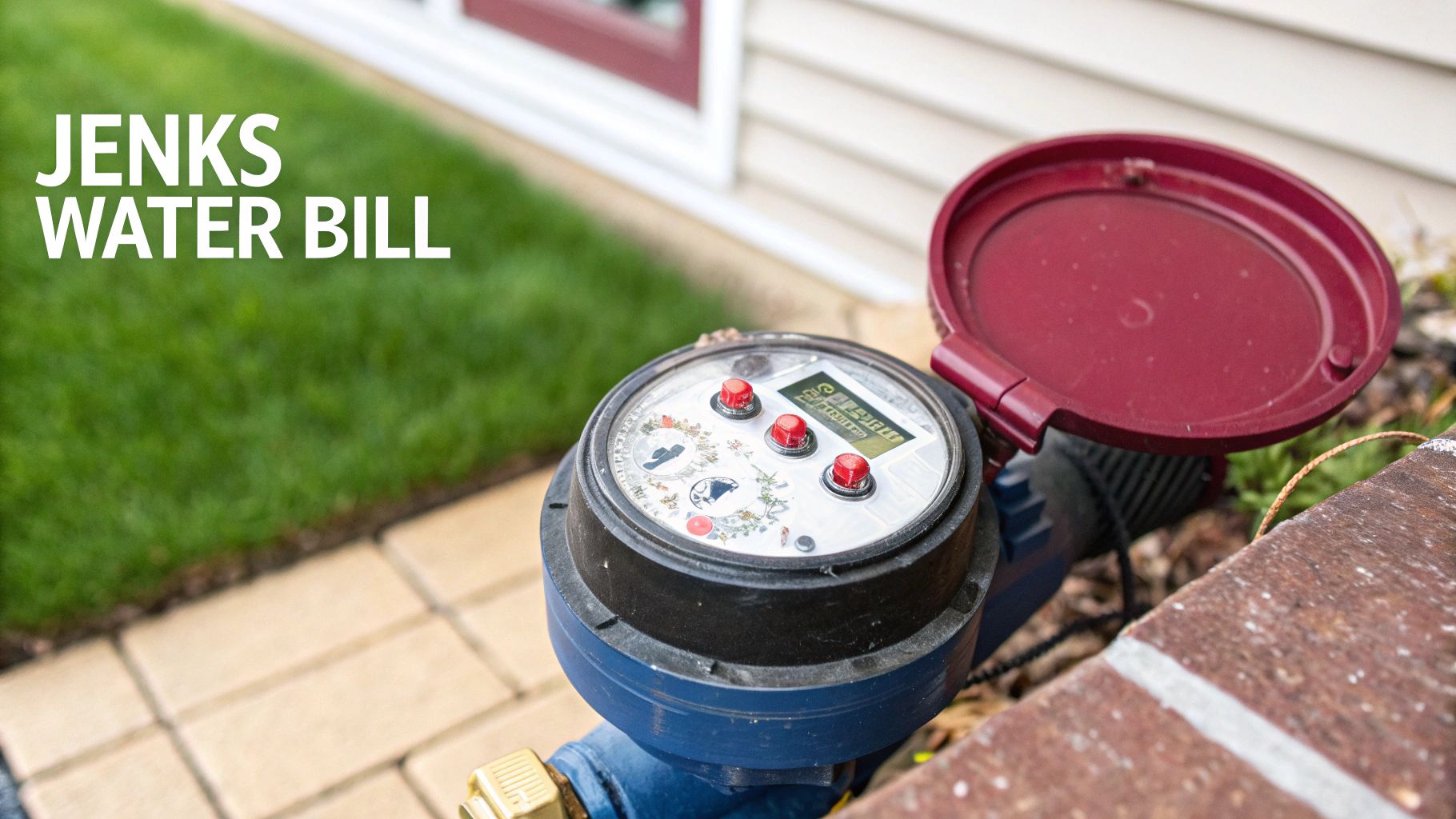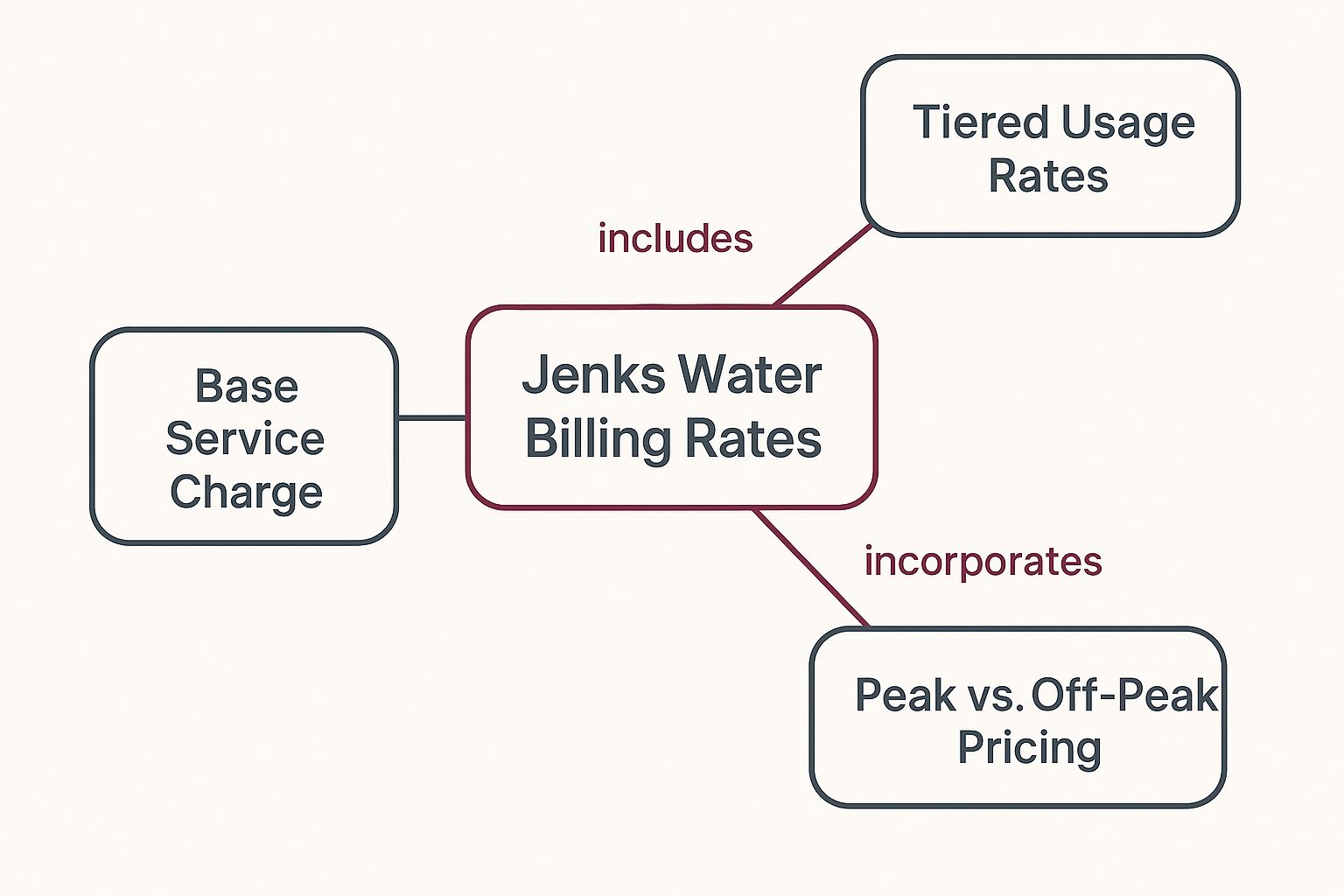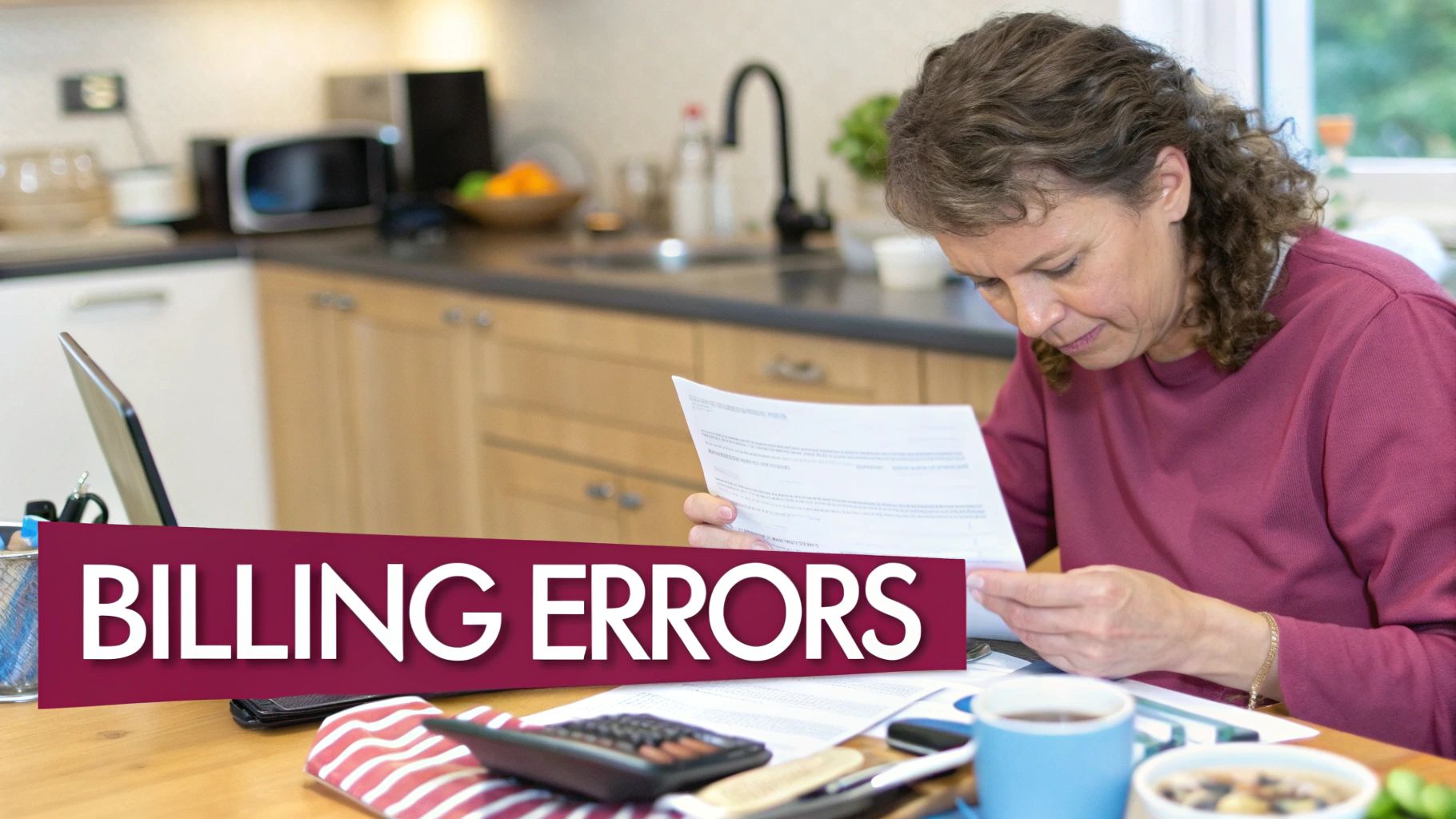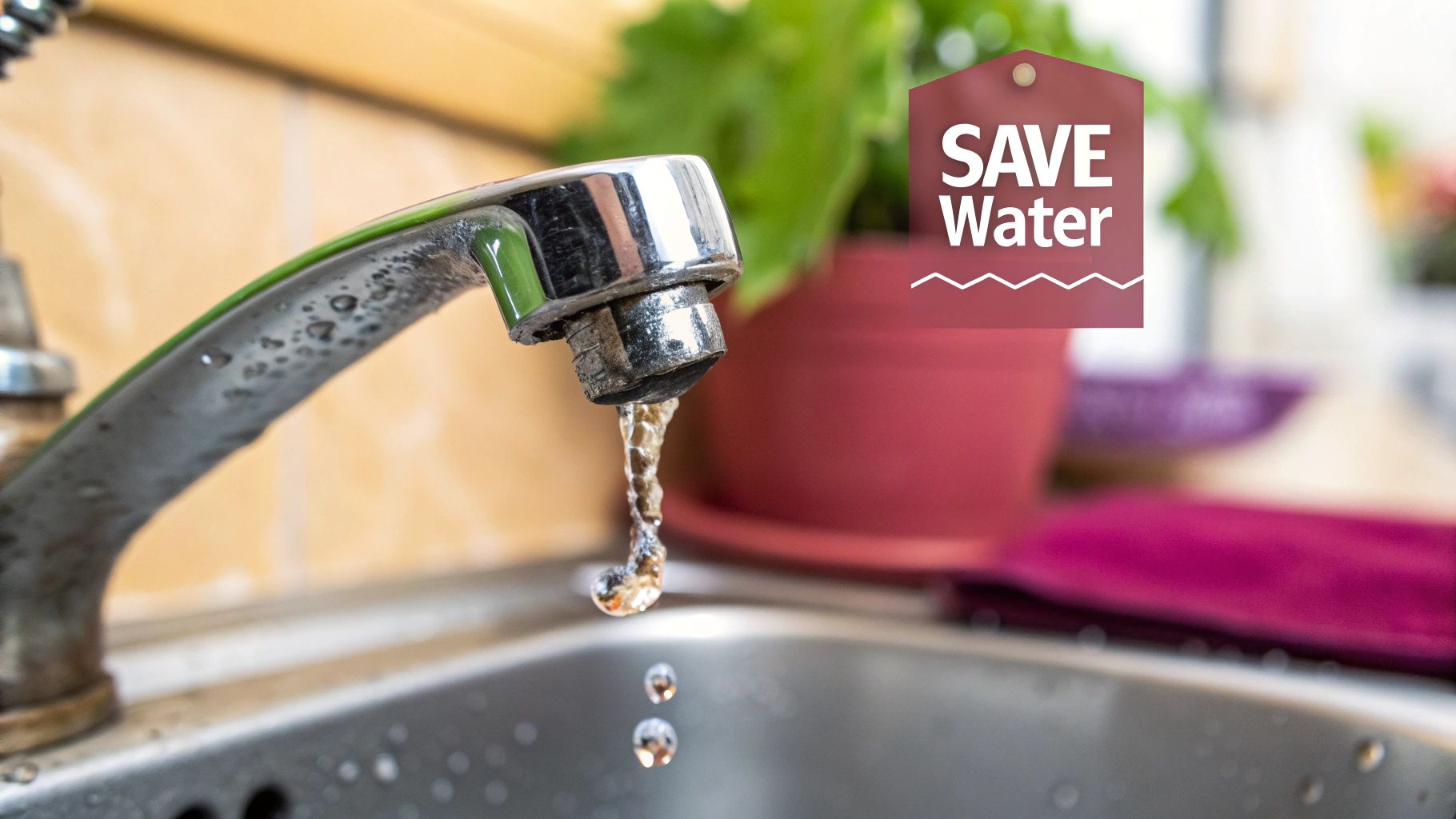Jenks Water Bill: Your Quick Guide to Payments & Rates
- sultan mbs
- Aug 24, 2025
- 14 min read
Ever stare at your Jenks water bill and feel like you need a translator? You’re not alone. It can feel a little overwhelming at first, but we're going to break it down so you know exactly where to look for the important stuff—like your account number, the due date, and of course, the total amount due.
Think of this as your personal guide to reading that statement with confidence.
Understanding Your Jenks Water Bill at a Glance

Your monthly water bill is more than just a number you have to pay; it’s actually a pretty detailed report card on your household's water habits. That mix of charts, numbers, and utility-speak might look complicated, but it’s all there to give you a clear picture of what you used and why it costs what it does.
The trick is to tackle it one piece at a time. The most critical info is usually placed right at the top so you can find it fast. Before you get lost in the line items, always find these key details first. It’ll make paying the bill or calling with a question a whole lot easier.
To make this even simpler, here's a quick breakdown of the most important sections you'll find on your bill and what they mean for you.
Key Sections of Your Jenks Water Bill
Bill Section | What It Tells You | Why It Matters |
|---|---|---|
Account Summary | Your account number, service address, and the billing period. | This is your ID. You'll need the account number for any payments or customer service calls. |
Amount & Due Date | The total balance you owe and the final day to pay without penalty. | This is the bottom line. Missing the due date can lead to late fees, so always check it first. |
Usage Information | How much water you used, often shown in gallons, sometimes with a historical graph. | This shows you where your money is going and helps you spot leaks or unusual spikes in consumption. |
Rate Breakdown | A line-by-line list of charges for water, sewer, trash, and other fees. | This explains how your total bill was calculated, separating service costs from your actual usage. |
This table is your cheat sheet. By knowing what each section does, you can quickly scan your bill and get the information you need without getting bogged down in the details.
Finding Critical Account Information
Think of the top portion of your bill as the command center. This is where you'll find your unique account number—the most important piece of information for paying online or talking to a customer service rep. Right next to it, you’ll see the service address and the date range this specific bill covers.
And, of course, the two big ones: the total amount due and the payment due date. They're always displayed prominently for a reason. Keeping a close eye on that date is the easiest way to steer clear of late fees and keep your service running smoothly.
Your bill's summary is like the headline of a news story. It gives you the most vital information upfront—who, what, and when—so you can act quickly without getting lost in the weeds.
Decoding Your Water Usage
One of the most helpful parts of your Jenks water bill is the usage graph. This little chart is a powerful tool, often showing your water consumption over the last few months. It lets you see your patterns at a glance, like how your water use naturally climbs in the summer when you're watering the lawn.
For a broader look at the water services in our area, you can check out our complete guide to https://www.thetendistrict.com/jenks/city-of-jenks-water-services-in-jenks-ok-74037-your-guide. And if you're curious how everyday activities add up, it's pretty eye-opening to learn about how many gallons of water a shower uses and tips to save.
Ever cracked open your Jenks water bill and wondered how it all adds up? It’s not as simple as a flat rate for every gallon you use. The final number on your statement is actually a blend of a few different moving parts, starting with a foundational charge that keeps the whole system flowing.
Think of the base service charge like a subscription fee for having access to clean, reliable water 24/7. This fixed amount appears on your bill no matter how much water you use that month. It covers the essential, behind-the-scenes costs of keeping everything running—from maintaining the pipes under our streets to paying the folks who manage the water treatment facilities.
Understanding the Tiered Rate Structure
Once that base charge is covered, your bill starts to reflect how much water you actually used, and this is where the tiered rate structure comes in. The easiest way to picture this is like a set of stairs.
Everyone starts on the bottom step, where the price per gallon is the lowest. This covers your first chunk of water usage. If you use more, you step up to the next tier, where the rate per gallon is slightly higher. This pattern continues for each tier.
This structure is designed to encourage us all to be a little more mindful of our water use. The less you use, the longer you stay on those lower, cheaper steps. It’s a smart system that means even small changes in your daily habits can make a real difference on your bill.
This handy graphic shows you exactly how the base fee, your usage, and these pricing tiers all come together.

As you can see, your final bill is a mix of that steady, fixed charge for service readiness and the variable charges that are tied directly to how much water your household consumed.
Deconstructing Other Fees on Your Bill
Beyond the fresh water coming into your home, your statement also includes charges for other critical services that handle the water after it goes down the drain. These aren’t random add-ons; they’re bundled together for convenience and represent the full cycle of water management in our community.
You’ll typically see a few other line items:
Sewer Service: This is the cost of safely transporting all the wastewater from your home to a treatment plant.
Sanitation: This fee covers your trash and recycling collection services. It’s often included in the utility bill to keep things simple.
Wastewater Treatment: A portion of your payment funds the highly complex process of cleaning and treating wastewater so it can be safely returned to the environment.
Each one of these charges is a piece of the puzzle that keeps Jenks healthy, safe, and clean. For a full rundown of everything covered, our Jenks utilities and services guide is a great resource.
Think of your bill as an itemized receipt for city services. While water consumption is the main variable, the fixed fees ensure the entire system—both clean water delivery and wastewater management—is funded and operational 24/7.
To keep up with rising operational costs and invest in our infrastructure, the city has to adjust these rates from time to time. For the 2024-2025 fiscal year, Jenks put a 7% increase into effect for both water and sewer charges. For an average household using around 6,653 gallons a month, this works out to be about $6.02 more on their monthly bill. You can dig into the details and see how we compare to other cities in the City of Jenks' official meeting documents.
Simple and Convenient Ways to Pay Your Water Bill

Alright, you've figured out how to read your bill. Now for the easy part: paying it.
The good news is the city offers a handful of different ways to settle up, designed to fit pretty much anyone’s schedule and preference. Whether you’re all about paying with a few clicks or you prefer the old-school methods, there’s a straightforward path to getting your account paid.
Picking the right method for you can save a bit of time and, more importantly, help you sidestep those pesky late fees. Let’s walk through the options so you can find what works best.
Digital Payment Options
For most people these days, paying online is the way to go. It’s fast, convenient, and you can do it from anywhere. The city’s official payment portal lets you make a quick one-time payment with a credit or debit card. All you’ll need is your account number handy to get it done.
If you really want to make life easy, check out the automatic bank draft, which you might know as Auto Pay. This is the ultimate "set it and forget it" tool. It automatically pulls the amount due from your checking or savings account on the due date each month. Honestly, it's the single best way to make sure your bill is never late.
To dig deeper into setting up these payment types and other available services, our full guide on City of Jenks water services has you covered.
Setting up automatic payments is like putting your bill on cruise control. It eliminates the monthly task of remembering to pay and is the single most effective way to avoid accidental late fees.
One quick heads-up: if you use a credit or debit card online or over the phone, there's usually a small convenience fee. This isn't from the city; it's what the third-party payment processor charges. The good news is that setting up an automatic draft directly from your bank account is typically free.
Traditional Payment Methods
Not a fan of paying online? No problem. There are still several reliable, traditional ways to take care of your bill. Each one gives you a different level of control and convenience.
Here’s a breakdown of the classic options:
Pay by Phone: Give the utility billing office a call during business hours. A representative can walk you through paying with your debit or credit card right over the phone.
Pay in Person: Just head over to Jenks City Hall. This is perfect if you want to pay with cash or check, or if you simply prefer talking to someone face-to-face and getting a receipt on the spot.
Pay by Mail: You can always send a check or money order. Just be sure to include the payment stub from your bill and mail it to the address listed. Pro tip: mail it a few days early to make sure it arrives on time.
Comparing Jenks Water Bill Payment Methods
To help you decide at a glance, we've put together a simple table comparing all the options. This should make it easy to see the pros and cons of each method.
Payment Method | Best For | Processing Time | Associated Fees |
|---|---|---|---|
Online Portal | Quick, one-time payments from anywhere | Almost instant | Convenience fee may apply |
Auto Pay | Avoiding late fees and saving time | Processes on the due date | None |
By Phone | Guided payment with a representative | Immediate | Convenience fee may apply |
In Person | Paying with cash or getting a receipt | Immediate | None |
By Mail | Paying with a check or money order | 3-5 business days | Cost of postage |
At the end of the day, it doesn't matter which path you take. The goal is just to make paying your Jenks water bill a simple, stress-free part of your routine.
Ever wondered who’s behind the scenes making sure you have clean, safe water every time you turn on the tap? In our city, that quiet, essential work falls to the Jenks Public Works Authority (JPWA).

Think of the JPWA as the operational heart of Jenks. Its mission goes way beyond just sending out your monthly water bill. This team manages a massive, complex network that handles everything from ensuring our drinking water is pure to maintaining the miles and miles of pipes buried beneath our streets.
They're also the ones looking ahead, planning for the long-term to ensure our city's infrastructure can support new homes, businesses, and the steady growth we're all seeing.
More Than Just a Bill Collector
The work of the JPWA is a constant, 24/7 operation. Your monthly payment isn't just a fee; it's a direct investment into the skilled teams and advanced equipment needed to keep Jenks’ water and sanitation systems running without a hitch.
This funding is what keeps the lights on and the water flowing, supporting a huge range of critical jobs:
Water Quality Management: They are constantly testing and treating our water to make sure it meets—and often exceeds—all safety standards.
Infrastructure Maintenance: This is the proactive work of repairing and replacing aging water mains, sewer lines, and pumping stations to prevent leaks and service disruptions before they happen.
System Expansion: As Jenks grows, the JPWA is strategically planning and building new infrastructure to keep up with the demand.
Wastewater Treatment: They also manage the entire process of cleaning our community's used water so it can be safely returned to the environment.
Knowing the JPWA’s role gives you a much clearer picture of where your money goes. It’s not just a utility bill; it’s funding the complex, dedicated work that keeps Jenks running smoothly day in and day out. For a broader look at how our city operates, A Resident's Guide to Jenks City Hall is a great resource.
A Strong Financial Foundation
Beyond the day-to-day operations, the JPWA serves as the financial backbone for these essential services. For instance, recent upgrades to water meters weren't just about new technology; they helped the authority boost its revenue by about $1.1 million in a single fiscal year.
How? By improving billing accuracy and catching unbilled water consumption. This kind of financial stability is absolutely crucial for supporting Jenks' continued urban growth. You can dive deeper into the city's financial health by checking out the official 2023 audit report.
Ever wonder what happens after your water goes down the drain? It’s not magic—it’s the start of a hidden, complex journey that your Jenks water bill makes possible. We’re not just talking about getting rid of used water; we're talking about collecting, transporting, and treating every single gallon from our homes and businesses. This is one of those crucial, out-of-sight services that protects public health and keeps our local environment safe.
To make it all happen, the city relies on a massive network of underground pipes and powerful lift stations. Think of a lift station as an elevator for water. It’s what gives wastewater the push it needs to travel uphill and over long distances to finally reach the treatment facility. Keeping this system running smoothly requires constant, careful maintenance—and that’s a big part of what your bill funds.
A Partnership for Professional Management
Managing a wastewater system at this scale is a highly technical job. To make sure it’s done right, the City of Jenks partners with industry experts who live and breathe this stuff. This approach brings specialized knowledge and efficiency to the table, letting the city focus on governing while the experts handle the day-to-day nuts and bolts of wastewater treatment.
In January 2023, after looking at all the options, the city awarded a major five-year contract to U.S. Water to manage our wastewater treatment facility and all the infrastructure that supports it. This partnership ensures Jenks stays in line with strict environmental rules while also keeping a handle on costs—something that’s incredibly important for a community growing as fast as ours. You can read more about how this collaboration supports Jenks's infrastructure goals.
Your monthly payment is a direct investment in this professional oversight. It’s what ensures the equipment is properly maintained, the processes are running efficiently, and the water returned to the environment is clean and safe.
The Full Water Cycle You Support
At the end of the day, your bill isn’t just paying for one piece of the puzzle—it covers the entire water cycle. It’s a continuous loop that starts with delivering clean, safe water to your tap and ends with responsibly managing it after it's been used.
The wastewater fees you see on your statement directly support:
Ongoing Maintenance: This means regular check-ups and repairs on all the pipes, pumps, and lift stations to prevent failures and keep the system reliable.
Advanced Treatment: This is the sophisticated science—a mix of biological and chemical processes—needed to purify wastewater to the highest standards.
Environmental Compliance: We’re talking about constant testing and reporting to make sure we meet every single state and federal water quality standard.
This all-in approach guarantees that the infrastructure serving Jenks today is tough, dependable, and ready for whatever the future holds. It’s a quiet but essential service that keeps our community healthy and allows it to thrive.
What to Do if Your Water Bill Suddenly Spikes
It’s always a little jarring to open your water bill and see a number way higher than you expected. But don't panic. A sudden spike is usually your home's way of telling you something small needs a little attention. More often than not, it’s a tiny, hidden leak that’s causing all the trouble.
With a few simple checks, you can play detective and figure out what’s going on.
Pinpointing the Problem
The investigation almost always starts at the toilet. Seriously. A worn-out flapper can cause a slow, silent leak from the tank into the bowl, wasting gallons and gallons of water without you ever noticing.
It’s an easy thing to check. Just add a few drops of food coloring into the toilet tank (the back part) and walk away for about 15 minutes. Make sure no one flushes! When you come back, check the water in the bowl. If you see any of that color in there, you’ve found your culprit. Constantly running toilets are a huge, and common, money-waster, so it's worth knowing more about fixing a constantly flushing toilet.
If the toilet isn't the issue, your next stop is the water meter itself. It's typically in a covered box out in your yard, near the curb. First, do a quick check to make sure everything that uses water in your house is turned off—no dishwasher running, no sprinklers on, nobody in the shower.
Now, take a look at the meter dial. If that little dial is still spinning, even just creeping along, that's a sure sign you have a leak somewhere on your property.
Taking Action and Getting Help
Once you've tracked down the problem, it's time to get it fixed. Many common issues, like replacing that leaky toilet flapper or tightening up a dripping faucet, are simple enough to handle on your own with a quick trip to the hardware store. But for anything more complicated or hidden, calling in a professional plumber is your best bet.
What if you've done your detective work and come up empty-handed? If there are no obvious leaks, the next step is to give the city a call. It could just be a simple billing question or a recent rate change you weren't aware of.
When you call, make sure to have your account number and the bill in question handy. That’ll help them pull up your information and get to the bottom of it much faster. For a complete list of who to contact, our guide to City of Jenks utilities and services has all the numbers you need.
We've gone through a lot of the nitty-gritty details, but sometimes you just want a straight answer to a simple question. This is that spot. We’ve rounded up some of the most common questions we hear from Jenks residents about their water service.
Think of this as your quick-reference guide.
When Is My Jenks Water Bill Typically Due?
You’ll find your specific due date printed right on your monthly statement, usually near the top. The city staggers its billing cycles based on where you live, so don't be surprised if your due date is different from your friend's across town.
The good news is that your due date should land around the same time each month, making it pretty predictable. But always, always check the statement itself for the exact date to stay on top of things.
What Happens If I Pay My Bill Late?
Life happens, we get it. But if a payment doesn’t make it to the city by the due date, a late fee is automatically tacked onto your next bill. The exact amount is set by the City of Jenks' official fee schedule.
If an account goes unpaid for too long, you’ll eventually get a shut-off notice. That can lead to more fees for both turning the water off and then getting it turned back on. The best advice? If you know you're going to miss a payment, call the utility billing office ahead of time to see what your options are.
A little proactive communication goes a long way. Calling the utility office before a due date passes shows you're on top of it and might open up solutions that prevent a small problem from snowballing.
How Do I Start or Stop Water Service When Moving?
Whether you're moving into Jenks or heading out, you'll need to get in touch with the Jenks Utility Billing department directly. It’s a pretty simple process, but you’ll want to plan ahead.
Here's the rundown:
Starting Service: Be ready with your new address, the date you want service to begin, and some form of ID. You might also need to pay a deposit or a one-time service fee to get the account up and running.
Stopping Service: Just let them know your current address and the final day you need the water on. This is key to making sure you don't get charged for water used after you've already moved out.
We highly recommend calling at least two business days before your move. This gives the department plenty of time to get you on their schedule and ensures you have a smooth transition without any water-less surprises.
From figuring out your utility bill to finding the best local spots, The Ten District is your go-to source for all things Jenks. Get to know the heart of our community at https://www.thetendistrict.com.



Comments